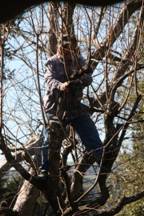“Trimming the Yuzu Tree: Relection #2”
 After watching Dominic trim the Yuzu tree in my cousin’s yard, I heard him express his concern that the tree will likely not bare much fruit because the area in which it was planted does not provide enough light. As Dominic explained, “It is not where you want it to be. It’s where it wants to be.” Dominic’s words provide a cautionary warning to those of us who care about our student’s success and cannot understand why our students will not respond to the opportunities we provide to them.
After watching Dominic trim the Yuzu tree in my cousin’s yard, I heard him express his concern that the tree will likely not bare much fruit because the area in which it was planted does not provide enough light. As Dominic explained, “It is not where you want it to be. It’s where it wants to be.” Dominic’s words provide a cautionary warning to those of us who care about our student’s success and cannot understand why our students will not respond to the opportunities we provide to them.
If we are too rigid in our expectations and too narrow in our focus, we can actually close off the sunlight that would cause our students to flourish. In constructing our course plans, we can build a fence—as John has done around his cherished Yuzu tree—that becomes more restrictive than protective.
One of the most extreme cases of such rigidity I have witnessed took place on 11 September 2001. As I was pulling out of the driveway, I heard that a plane had hit one of the Twin Towers in New York City. A few minutes later, a second plane hit the other tower. A third plane crashed into the Pentagon shortly after I arrived on campus. Later, a fourth plane crashed in Pennsylvania. And during all of this turmoil, some of my colleagues continued to teach as if nothing was happening in the outside world. As they later explained, “We have so much material to cover during the semester, we didn’t have any choice.”
America was under attack. Large buildings around the country were being evacuated; including buildings in Detroit where the parents of some of my students worked. We were being overwhelmed with confusion, fear, and sorrow. Students on 9-11 might have dutifully showed up for class, but they were not really present and attentive to their academic subjects. Like John’s Yuzu tree, they were shaded by outside events over which none of us had any control.
Some colleagues can congratulate themselves on sticking to their syllabi. But the real question is, “What did their students actually learn?”
I know that on 9-11, my students and I watched television. Together, we saw the Twin Towers fall. Together, we watched the destruction of the Pentagon and learned the news of the fourth plane’s unsuccessful attack on the White House. As a professor, I knew that it is not about where I wanted my students to be; it was about where they wanted to be. And they did not want to be learning about composition.
However, my students did learn composition from the events that took place on 9-11. Instead of being fenced in by my syllabus, I rearranged it so that we could use writing to react to the events of the world. From a pedagogical point of view, the class period we spent watching television became the prompt for learning the skills of effective writing. From an emotional point of view, I knew that my students wanted to deal with the events of 9-11 and therefore I did not try to force them to deal with the topics I had chosen for the class. As a result, they wrote more perceptive essays than they would have had they stuck to the well designed plan I had conceived for the course.
John knows that he cannot force the Yuzu tree to reach its potential if he tries to impose his will on to it. Gardening, like education, requires us to do our best to adapt to the needs of each plant.
- –Steven L. Berg, PhD
Photo Caption:
On 9/11 my wife Sandy was at an assisted living place down the street from Schoolcraft. The elderly there were puzzled why people were so distraught, for they remembered Pearl Harbor in 1941 and the Cuban Missile Crisis in 1972 ( in the latter we can with a few hours of all out nuclear attack between us and Soviet Union). In the model of class without walls , it might be advisable at such time as 9/11 to move within a few days or weeks the class from talking to each other in a common age demographics to a dialogue with another demographics. Of course, the greatest attacks on our soil have been from each other during the Civil War. But we Americans have a tendency to believe that nothing counts before we were born, if even that. We might want to move the class room outside our class walls to living people before we were alive. Sometimes we are such contemporary chauvinists .